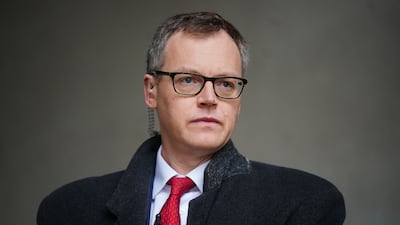The UK and Libya vowed to boost co-operation and strengthen joint operations to counter the irregular migration influx towards Europe.
On an official visit by British Minister of State for Illegal Migration Michael Tomlinson to Tripoli on Monday, the two countries discussed means that could be introduced to implement a firmer policy on migration.
Mr Tomlinson, who was joined by British ambassador to Tripoli Martin Longdon, held talks with Libyan Prime Minister of the Tripoli-based National Unity government, Abdul Hamid Dbeibah, and Libyan Presidential Council member Musa Al Koni.
Mr Dbeibah expressed his country’s commitment to co-operate with all its neighbours and those who would like to assist its efforts in managing the large number of migrants it is hosting as a transit destination.
“Libya is not a destination country in itself but it is rather a transit area for illegal migrants,” he told Mr Tomlinson.
“For that reason we seek to co-operate with all states involved in this question and we especially appreciate the UK’s willingness to offer its support to Libya regarding this matter.”
Meanwhile, Mr Al Koni told the visiting British delegation of the need to provide Libya with the necessary logistical support to secure its southern borders and reduce the flow of migrants towards the north, where they could cross the Mediterranean to Europe.
Migrants arriving in Europe - in pictures
Most migrants in Libya come from Sub-Saharan African countries. They usually enter its territories through its southern borders with Chad, Niger and Sudan.
Mr Al Koni also said that the polarised political situation in Libya makes it difficult to reach a unified strategy that would ensure securing the borders and deterring irregular migrants from crossing the Mediterranean to Europe.
Mr Tomlinson asserted to the Libyan officials that his government is working hard to provide all the necessary assistance to Libya to curb the migration influx towards Europe, saying this question is a top priority for his country.
Since the overthrow of Libyan dictator Muammar Qaddafi’s regime by rebels – backed by western air strikes – in 2011, Libya has been rocked by unrest.
The country remains divided because of a continuing rivalry between two governments, one based in the west in Tripoli and another in the east in Benghazi, and different armed factions’ attempts to seize control of the oil-rich North African state.
It has been a favourable environment for developing well-organised smuggling and human trafficking networks that continue to take advantage of the dire and fragile circumstances migrants face in North Africa.
According to the UN’s Migration Agency IOM, Libya is home to about 704.000 migrants from more than 43 nationalities, with most fleeing their home countries because of war, armed conflict, political persecution or even degrading environmental conditions.
Most of these migrants die in the desert as they are on their journey to the northern part of their continent, or at sea, when they try to reach their final destination, Europe.











